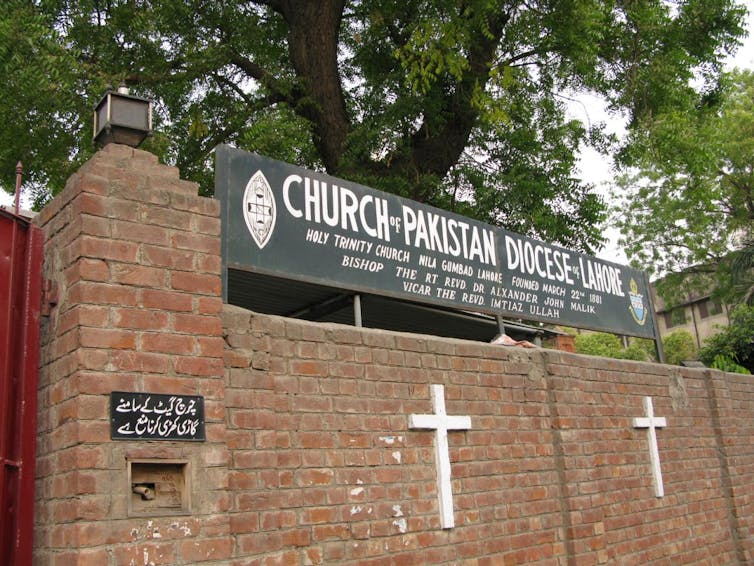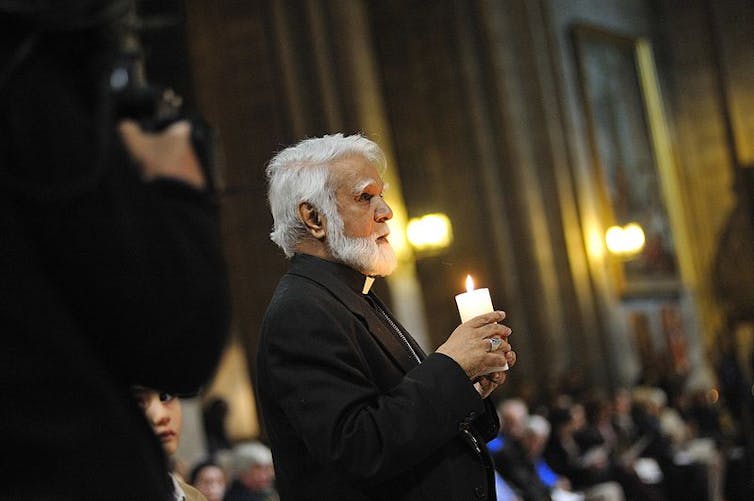What Pope Francis' choice of a Pakistani cardinal means for Christians of the country
- Written by Myriam Renaud, PhD Candidate in Religious Thought and Ethics, University of Chicago
Pope Francis will create 14 cardinals on June 29[1], among them Pakistan’s Joseph Coutts, currently the archbishop of Karachi. What might come as a surprise to some people is that Pakistan, though a majority-Muslim country, is home to some 2.5 million Christians, approximately half of whom are Roman Catholics.
As my research as a scholar of global religions[2] shows, most of Pakistan’s Christians have an unusual history.
Early conversions
Most Christians in Pakistan, including Catholics, owe their religious affiliation to the activities of missionary societies during the 19th and early 20th centuries in the Punjab region of what was then British-ruled India.
Early evangelization efforts by both the British and Americans in India focused on upper-caste Hindus. The assumption was that these Hindus would use their influence to convert members of the lower castes. This approach led to few converts. However, in the late 19th century, American missionaries changed course and began to baptize Hindus from the sweeper caste[3].
Hindus from this caste are traditionally assigned jobs considered “polluting,” such as skinning animals, removing the bodies of the unclaimed dead, and cleaning toilets. The missionaries’ new approach proved successful, in part because conversion to Christianity offered hope of escape from Hinduism’s caste system.
When the British left the Indian subcontinent in 1947, they carved territory out of India to create the new country of Pakistan for Muslims, who were a minority in India. The region of Punjab, where most Christians lived, became part of Pakistan.
The majority of Christians chose to remain in Pakistan. They believed that they would fare better there because Islam rejects social divisions on theological grounds.
Lower socio-economic status
 A church in Pakistan’s city of Lahore.
leenient, CC BY-NC[4][5]
A church in Pakistan’s city of Lahore.
leenient, CC BY-NC[4][5]
In practice, after the creation of Pakistan, not much changed economically or socially for the Christians who stayed: The caste system continued to exist[6] in the new country.
Even today, most Pakistani Christians living in major cities are consigned to sanitation jobs[7] and a life of poverty. In Pakistan’s northwest city of Peshawar, for example, as many as 80 percent of Christians are sanitation workers. In another of its major cities, Lahore, Christians account for 6,000 out of 7,894 sanitation workers[8].
Newspaper ads for sanitation jobs, including by government agencies, frequently call for non-Muslims. One of Asia’s Catholic news agencies, UCANews, reported that in May 2017, the Hyderabad Municipal Corporation issued a call for 450 sanitation workers, offering contracts[9] that required employees to be non-Muslim and to take this oath: “I swear by my faith that I will only work in the position of a sanitary worker and not refuse any work.”
Consigned to a low social hierarchy, poverty among Christians remains widespread. A 2012 survey in Lahore[10] reported by the watchdog organization, Minority Voices, found that the average monthly income of Christian families was US$138, a per-capita daily income of US$0.92, which is well below the poverty line defined by the World Bank. In contrast, during the same year, the average monthly income for all Pakistanis[11] was US$255.
Blasphemy laws target minorities
The condition of Christians only worsened when General Muhammad Zia ul-Haq, Pakistan’s dictatorial president, started the Islamization of the country[12] in the 1970s.
Originally, for example, Pakistan’s blasphemy laws punished offenders who intended to wound the religious sensibilities of others. Zia added several Islam-specific clauses to this nonsectarian code, including making blasphemy against the Prophet Muhammad punishable by death.
Anthropologist Linda Walbridge, writing about the conditions of Pakistani Christians[13], notes that by the 1990s “Christians certainly believed they were the targets of systematic oppression.” That oppression, she observes came largely “in the form of laws that have increasingly been used against them.”
Indeed, laws intended to protect Islam have sometimes been used against Christians and other minorities to settle personal scores or business disputes. In one incident, a Christian couple refused to pay back their Muslim boss who had lent them money. A mob burned them alive after the boss accused them of blasphemy[14].
Goan Catholics and Coutts
 Pakistan’s Joseph Coutts, currently the archbishop of Karachi.
Par Ollivry, CC BY-SA[15][16]
Pakistan’s Joseph Coutts, currently the archbishop of Karachi.
Par Ollivry, CC BY-SA[15][16]
Unlike the 97 percent of Pakistan’s Christians[17] who trace their roots to the Punjab region, Archbishop Coutts traces his roots to the Goa region of India[18]. This lineage can make a big difference.
Colonized by the Portuguese at the end of the 15th century, Goa became a center for Catholic leadership in the region. During British rule, Catholic Goans found work with the British, and some established themselves in the city of Karachi, now in Pakistan. There they improved their lot by taking advantage of educational opportunities.
Today, Pakistan’s Goan Catholics, whose customs and attitudes tend to be Westernized, are generally considered an elite among Christian groups and fare better than other such groups. Coutts will be the fifth cardinal of Goan origin and the second cardinal from Pakistan. The first Pakistani cardinal, elevated in 1973, was also of Goan origin.
Coutts has been praised[19] for his interfaith and humanitarian work. The 56 schools run by his archdiocese[20] admit students regardless of caste, color or religion, and subsidize the education of poor students.
While the selection of Coutts may not improve the living conditions of Pakistani Christians, it sends them a signal of solidarity. And, in spite of their ongoing persecution, it acknowledges, as Coutts said[21], that “there is a viable, visible and active Christian community in Pakistan.”
References
- ^ 14 cardinals on June 29 (indiancatholicmatters.org)
- ^ scholar of global religions (divinity.uchicago.edu)
- ^ baptize Hindus from the sweeper caste (books.google.com)
- ^ leenient (www.flickr.com)
- ^ CC BY-NC (creativecommons.org)
- ^ caste system continued to exist (www.serialsjournals.com)
- ^ consigned to sanitation jobs (www.ucanews.com)
- ^ 6,000 out of 7,894 sanitation workers (www.thefridaytimes.com)
- ^ offering contracts (www.ucanews.com)
- ^ 2012 survey in Lahore (minorityvoices.org)
- ^ average monthly income for all Pakistanis (www.statista.com)
- ^ the Islamization of the country (www.jstor.org)
- ^ the conditions of Pakistani Christians (books.google.com)
- ^ accused them of blasphemy (www.nytimes.com)
- ^ Par Ollivry (commons.wikimedia.org)
- ^ CC BY-SA (creativecommons.org)
- ^ 97 percent of Pakistan’s Christians (www.serialsjournals.com)
- ^ roots to the Goa region of India (timesofindia.indiatimes.com)
- ^ Coutts has been praised (www.arabnews.com)
- ^ The 56 schools run by his archdiocese (www.dawn.com)
- ^ it acknowledges, as Coutts said (www.dw.com)
Authors: Myriam Renaud, PhD Candidate in Religious Thought and Ethics, University of Chicago

